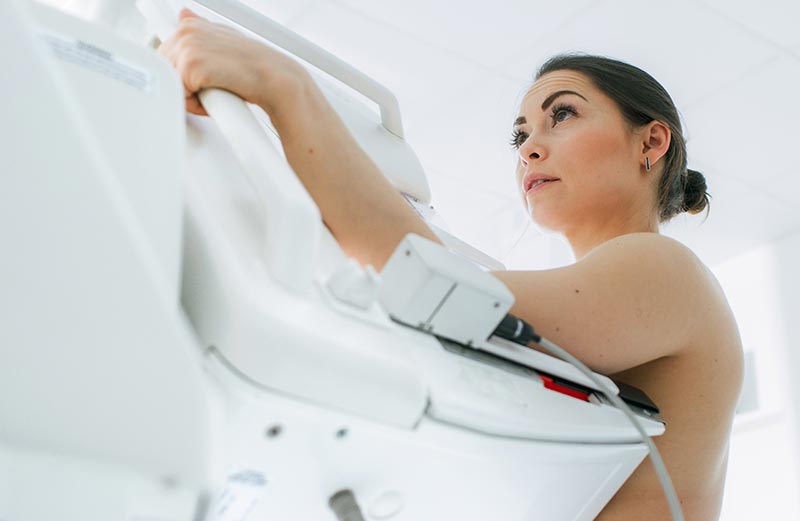North Dakota lags behind much of the nation in scheduling mammograms. See what we can do increase our standing—and our odds of beating breast cancer.
Breast health screenings

As North Dakotans, we can do better in checking for breast cancer. According to the American Cancer Society, our state lags behind much of the nation in mammography screenings. In fact, we rank 32nd out of 50 states.
For most women, mammogram technology is still considered the best way to detect breast abnormalities and cancers early. The National Cancer Institute recommends a mammogram every one to two years beginning at age 40.
If you’ve had breast cancer or have other risk factors, you and your doctor will want to create a different breast screening protocol.
What is a mammogram?
A mammogram is a breast X-ray taken as you stand in front of a special machine. A technologist takes the pictures and a radiologist reads them, compares them to your previous mammogram images and interprets them. Results typically come in the mail. Occasionally the radiologist wants additional images in which case a scheduler will contact you.
Newer 3D mammogram technology is available and may be of benefit to you. Discuss which option is the best for you.
Other screening types
In addition to mammograms, there are other tools available to screen for breast cancer.
Breast self-awareness and exam
Being familiar with how your breasts look and feel can help you notice symptoms such as lumps, pain or changes in size. Be sure to report concerns to your provider.
Clinical breast exam
Usually conducted during your annual physical, a clinician uses his or her hands to feel for lumps or other changes in your breasts.
Breast magnetic resonance imaging (MRI)
For women at high risk, your provider may suggest an MRI, which uses magnets and radio waves to take pictures of the breast. Because breast MRIs can appear abnormal even when there is no cancer, they are not used for women at average risk.
While screening cannot prevent breast cancer, it can help detect it early, when it is easier to treat. Talk to your doctor about which breast cancer screening tests are right for you, and together you can determine a plan.
WISDOM Study
BCBSND is supporting the WISDOM (Women Informed to Screen Depending on Measures of Risk) Study to help find a better, more personalized way to screen for breast cancer.
In collaboration with the University of California-wide Athena Breast Health Network, WISDOM researchers will engage up to 100,000 women and their doctors across the country. The goal of the trial is to compare the effectiveness of a personalized screening protocol based on individual risks, such as genetic makeup and family history, to annual screening. The results of this study have the potential to impact existing standards of practice on screening and prevention, diagnosis, and treatment of breast cancer.
Participation is easy and free. If you’re interested in learning more about the WISDOM Study and whether you qualify to participate, visit https://www.thewisdomstudy.org/.
Wondering what’s covered in your BCBSND plan?
Check your plan documentation or call Member Services at the number listed on the back of your insurance ID card.